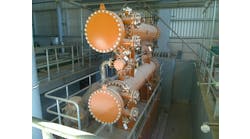Now that a new president has finally been elected there’ll be no more pre-presidential-election polls to show us what our peers are thinking, planning and hoping for the next four years.
But we still want to know what you are thinking, planning, hoping for and doing in your plant and the profession. Voting in the monthly polls on ChemicalProcessing.com allows you to offer your input on important issues. You gain in several ways. You can compare your perspective with that of other respondents when we publish the results the following month in the InProcess section of the magazine. For instance, are many plants doing things differently than your site? How does what you consider important compare with others’ views? Plus, the results help us refine what we cover in print and on the Web site so we can serve you better.
Consider the results of our last month’s poll: “How would you characterize maintenance practices at your site?” (http://www.chemicalprocessing.com/articles/2008/167.html).
There’s a lot of talk about predictive maintenance, but how extensively do plants actually practice the approach? What we found was nearly as many respondents called their plants’ practices not predictive at all as said mostly predictive! These insiders have provided a benchmark for comparing where you stand. And, most assuredly, we’ll be publishing more content on the topic like “Grasp Maintenance’s Bottom Line” (http://www.chemicalprocessing.com/articles/2008/178.html).
Another poll queried readers about fugitive emissions problems. Nearly one-third (29%) of respondents stated that fugitive emissions were inconsequential at their site. One reader even added that his site has a good Hazardous Communication/Resource Conservation and Recovery Act (HAZCOM/RCRA/) program and a very reliable recovery time objective (RTO) system. On the flip side, 14% of readers said their fugitive emissions problems were “Very Significant” and 33% stated their fugitive emissions problems were “Moderate.”
The takeaway from this poll? Investigate HAZCOM/RCRA programs and RTO systems. If one reader stated fugitive emissions were inconsequential and touts these programs, they may be worthwhile for your site as well.
In terms of education, many readers sounded off about the lack of practical experience new engineering graduates receive in college.
In fact, our poll found that 51% of respondents think that new engineering graduates are “poorly” or “very poorly” prepared for a career in the industry (37% and 14%, respectively).
One respondent stated, “With few exceptions, engineering schools focus on theory, not reality. While theory should apply to reality, there are often ‘bumps in the road’ that only experience can bring. Engineers that have been a part of a co-operative work program are far better prepared . . . .”
So, if you’ve been concerned about this, you’re not alone. And hopefully these data can provide valuable talking points not only for discussions with new graduates but with academics as well. And it points up the value of our continuing emphasis on providing practical information, which can only help get these young engineers better grounded in the real world of industry.
The We Want To Know poll resides on the www.ChemicalProcessing.com homepage for easy viewing. Take our current online poll and tell us what’s the main factor impeding maintenance at your site -- http://www.chemicalprocessing.com/articles/2008/212.html
Here’s to getting to know you and to benchmarking success.
Latest from Reliability & Maintenance
Latest from Reliability & Maintenance

